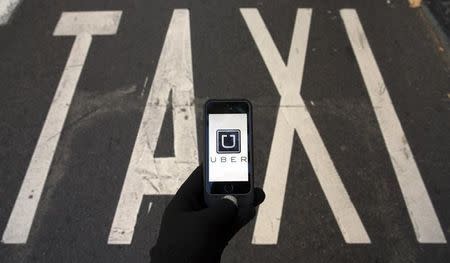Uber driver attacked in Kenya, his taxi torched: police

By Humphrey Malalo and Drazen Jorgic
NAIROBI (Reuters) - Four men attacked a taxi driver working for ride hailing company Uber and torched his car in the Kenyan capital of Nairobi, police said on Monday, the latest incident of growing harassment against Uber drivers in the East African nation.
Uber drivers around the world have faced threats and protests from regular taxi operators, who say cheap fares from Uber drivers are driving them out of business.
Japheth Koome, Nairobi's Police Commander, said the men attacked the Uber driver late on Sunday and poured petrol on his vehicle before torching it.
"I believe police will get them since we have details of their vehicle," Koome told Reuters. "We shall take serious steps against people trying to smash cars of their business rivals."
He said the driver was beaten but escaped without major injuries.
Uber said it has offered its full support to the driver and is in contact with the authorities.
"Our thoughts are with the driver," Alon Lits, Uber's general manager for Sub-Saharan Africa, said in a statement. "We ask the authorities to condemn this violence in the strongest possible terms."
Uber began operating in Kenya in early 2015, making inroads into the Nairobi market by offering lower prices and cutting out haggling that often infuriates customers.
But earlier this month regular cab drivers threatened to paralyze transport if the government did not drive the Uber taxi service from Nairobi within seven days.
The government refused their demand and warned anyone stoking violence would be prosecuted. But they also said the government was drafting new laws regarding the regulation of online taxi operators.
Nairobi Uber drivers say the increasing threats of violence have forced them to hide their smartphones, which they use to map routes and charge customers, but often show they are an Uber driver.
Uber operates in more than 300 cities in 67 countries and has raised $7.4 billion from investors.
Protests against Uber have been held in France, Brazil and Hungary, and Uber drivers have been threatened or attacked in South Africa, Costa Rica, and Australia.
(Writing by Drazen Jorgic; editing by Katharine Houreld)


